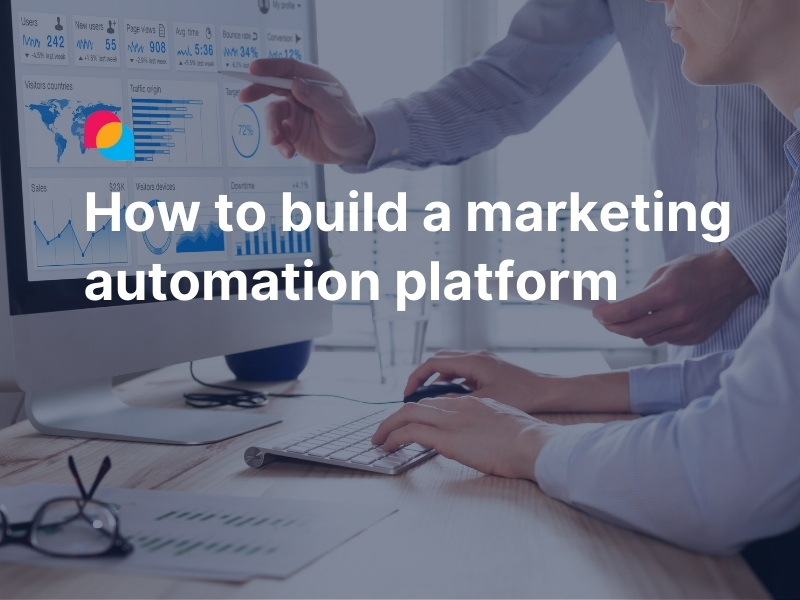In today's digitally-driven marketplace, the quest for a more personalized, efficient, and predictive marketing strategy is relentless. With the advent of artificial intelligence (AI), a new horizon in marketing strategies is being explored, one that promises to transform the way businesses connect with their customers. AI, with its unparalleled ability to analyze data, predict trends, and automate tasks, is not just an addition to the marketing toolkit; it's a revolutionary force redefining the landscape.
Overview of AI’s Role in Marketing Automation
Marketing automation, traditionally viewed as a means to streamline email campaigns and other repetitive tasks, is undergoing a transformation. AI is elevating marketing automation from a tactical tool to a strategic asset, enabling businesses to conduct predictive analysis, enhance customer segmentation, and deliver personalized experiences at scale. But what does integrating AI with marketing automation entail? And how can businesses leverage this integration for enhanced predictive analysis?
Understanding Marketing Automation
Defining Marketing Automation: Beyond Email Campaigns
Marketing automation has often been pigeonholed as a tool for automating emails. While email automation remains a crucial component, the true essence of marketing automation is far broader. It encompasses a suite of tools designed to optimize and automate a wide range of marketing tasks and workflows, from lead generation to customer segmentation, campaign management, and analytics. At its core, marketing automation is about efficiency and personalization; Delivering the right message, to the right person, at the right time, without manual intervention.
The Evolution of Marketing Automation Technologies
The journey of marketing automation technologies has been one of rapid evolution and expansion. What started as simple batch-and-blast email services has transformed into sophisticated platforms that integrate with CRM systems, social media, and analytics tools to provide a 360-degree view of the customer journey. Today, these platforms leverage machine learning and AI to further refine and personalize marketing efforts, making predictive recommendations based on customer data and behavior patterns.
Key Components of Marketing Automation Systems
A robust marketing automation system includes several key components:
- Lead Generation and Management: Tools for capturing, scoring, and nurturing leads through the sales funnel.
- Campaign Management: Features for designing, executing, and monitoring marketing campaigns across multiple channels.
- Customer Segmentation: Capabilities for dividing the customer base into distinct groups based on behavior, preferences, or demographics.
- Analytics and Reporting: Analytics to measure campaign effectiveness, track engagement, and refine strategies based on data insights.
- Integration and Scalability: The ability to integrate with other business systems (CRM, social media, etc.) and scale with the growth of the business.
The Rise of AI in Marketing
AI’s Impact on Marketing: A Paradigm Shift
The integration of AI into marketing signals a paradigm shift from reactive to proactive strategies. Instead of responding to trends, marketers can now anticipate them. AI's predictive capabilities enable marketers to forecast consumer needs and preferences, leading to more targeted and effective marketing strategies. This proactive approach not only enhances customer satisfaction but also drives higher conversion rates and ROI.
AI in Action within Marketing:
- Marketing and Sales Efficiency: Businesses are leveraging AI to automate and enhance various functions, from content creation to customer service, leading to substantial time savings and productivity boosts. For instance, marketers using generative AI save an average of three hours per content piece created, while sales and service professionals see significant reductions in time spent on manual tasks.
- Improved Content Quality and Personalization: The use of AI in content creation not only accelerates the process but also enhances the quality and personalization of marketing efforts. About 63% of marketers report that content created with generative AI performs better than that made without it, underscoring the technology's ability to align web content with search intent and improve user experience, according to Hubspot.
- Dynamic Audience Targeting and Segmentation: Generative AI is transforming lead generation and customer segmentation by leveraging vast amounts of data to identify and target relevant audiences with personalized content. This allows for more efficient and effective marketing campaigns, driving higher engagement and conversion rates.
Read Also:
Bridging AI with Marketing Automation
The Synergy between AI and Marketing Automation
The fusion of AI with marketing automation creates a synergy where the sum is greater than its parts. AI brings intelligence and predictive capabilities to the automation framework, transforming static campaigns into dynamic, adaptive strategies. This synergy allows for more sophisticated segmentation, targeting, and personalization, which are key to engaging modern consumers.
Technical Foundations for Integrating AI into Marketing Automation
Integrating AI into marketing automation requires a solid technical foundation:
- Data Infrastructure: A robust data management system to collect, store, and process large volumes of data.
- Integration Capabilities: Seamless integration with existing marketing and CRM platforms.
- AI and Machine Learning Models: The development and implementation of models suited to specific marketing tasks and objectives.
- Analytics and Visualization Tools: Tools to interpret AI-generated insights and translate them into actionable strategies.
Overcoming Common Challenges in Integration
The integration of AI with marketing automation can present challenges, including data quality and privacy concerns, the complexity of AI technologies, and the need for skilled personnel. Overcoming these challenges requires a strategic approach that includes investing in quality data management practices, prioritizing user privacy, simplifying AI adoption through user-friendly platforms, and fostering a culture of continuous learning and innovation.
Implementing AI for Predictive Analysis in Marketing Automation
Step-by-Step Guide to Integrating AI with Marketing Automation
- Assessment and Planning: Begin with a thorough assessment of your current marketing automation capabilities and data infrastructure. Identify objectives for integrating AI, such as improving customer engagement or increasing sales through predictive analytics.
- Data Preparation: Ensure your data is clean, comprehensive, and structured in a way that's accessible for AI analysis. This may involve data consolidation, cleaning, and enrichment processes.
- Selecting the Right AI Tools: Choose AI tools and technologies that align with your marketing goals and integrate well with your existing marketing automation platform. Consider factors like ease of use, scalability, and support.
- Integration and Testing: Work with IT and data science teams to integrate AI tools into your marketing automation system. Conduct thorough testing to ensure the integration is seamless and that the AI models are performing as expected.
- Training and Deployment: Train your marketing team on how to use the new AI capabilities. Deploy AI-enhanced campaigns, starting with pilot projects to refine your approach based on real-world results.

Selecting the Right AI Tools for Your Marketing Strategy
When it comes to choosing AI tools, it's imperative to look for features that support your long-term marketing strategy:
- Scalability: Ensure the tool can accommodate your business's growth and evolving needs.
- Compatibility: The tool should integrate seamlessly with your existing marketing automation system.
- User-Friendly Interface: A straightforward interface is vital for enabling your team to make the most of the AI tool.
- Support and Training: Adequate support and training resources are essential for a smooth onboarding process and ongoing usage.
Setting Up AI-driven Predictive Analytics: A Practical Framework
- Define Key Metrics: Clearly identifying the customer behaviors or sales metrics you aim to predict with AI is a fundamental step. This clarity guides the development of your predictive models and ensures they are aligned with your business objectives.
- Data Integration: Guarantee that your AI tools have comprehensive access to all relevant data sources. This holistic view is critical for the accuracy of your predictive models.
- Model Development: Collaborate with data scientists to develop predictive models specifically tailored to your marketing objectives. These models are at the heart of your AI-driven predictive analytics efforts.
- Continuous Learning: Implement systems that enable your AI tools to continuously learn and adapt over time. This dynamic learning process allows your predictive models to evolve based on new data and outcomes, ensuring they remain accurate and effective.
Enhancing Customer Segmentation with Predictive Analysis
AI-driven predictive analysis enables more nuanced customer segmentation. Beyond basic demographic and behavioral segmentation, AI can identify subtle patterns and micro-segments within the data. This level of segmentation allows marketers to craft highly targeted campaigns that speak directly to the interests, needs, and behaviors of specific groups, significantly improving engagement and conversion rates.
Navigating Data and Privacy Concerns
Ensuring Data Privacy in AI-driven Marketing Strategies
Adhere to data privacy laws and regulations, such as General Data Protection Regulation (EU GDPR) and California Consumer Privacy Act (CCPA), by implementing strict data governance policies. Be transparent with customers about how their data is used and give them control over their information.
Best Practices for Data Management and Compliance
- Regular Audits: Conduct regular audits of your data practices to ensure compliance.
- Secure Data Storage: Use secure, encrypted systems for storing sensitive customer data.
- Privacy by Design: Incorporate privacy considerations into the development of your marketing and AI strategies.
Measuring the Success of AI in Marketing Automation
Key Performance Indicators for AI-Enhanced Marketing Campaigns
To truly understand the impact of AI on marketing efforts, it's crucial to monitor specific KPIs. These include conversion rates, customer lifetime value, churn rate, and engagement metrics. Each of these indicators serves as a lens through which the effectiveness of AI-integrated marketing automation strategies can be assessed.
- Conversion Rates: A higher conversion rate indicates that your AI-driven campaigns are effectively persuading potential customers to take a desired action, whether that's making a purchase, signing up for a newsletter, or another goal specific to your business.
- Customer Lifetime Value (CLV): By predicting future purchasing behaviors, AI helps in crafting personalized marketing messages, thus potentially increasing the CLV. A rise in this metric signifies that customers are finding more value in your offerings, a direct testament to the effectiveness of personalized, AI-driven marketing strategies.
- Churn Rate: AI can identify patterns that indicate a customer is likely to leave before they actually do, providing an opportunity to intervene. A decrease in churn rate is a clear indicator that your AI-enhanced initiatives are successful in retaining customers.
- Engagement Metrics: Engagement metrics, such as open rates for emails, click-through rates, and social media interactions, provide insights into how compelling your AI-customized content is to your audience.
Future Trends in AI and Marketing Automation
Integrating AI with marketing automation offers businesses a significant strategic advantage. By enhancing predictive analysis capabilities, AI enables businesses to anticipate and respond to market trends and customer behaviors more effectively. This foresight allows for the personalization of marketing messages at scale, ensuring that each customer receives content and offers that resonate with their unique preferences and needs.
Conclusion:
As we look to the future, it's clear that the integration of AI and marketing automation is not just an option but a necessity for businesses seeking to thrive in the digital marketplace. Companies that embrace this integration will be better equipped to predict and meet customer needs, personalize customer experiences at scale, and navigate the complexities of digital marketing with unparalleled insight and agility.
In conclusion, the strategic integration of AI and marketing automation represents a pivotal opportunity for businesses to redefine how they engage with their customers, drive sales, and achieve sustainable growth. By staying informed about emerging AI technologies and trends, fostering a culture of continuous learning, and leveraging the power of AI-driven marketing automation, businesses can secure a competitive edge in the rapidly evolving digital landscape.
References:
The state of AI in 2023: Generative AI’s breakout year - Mckinsey & Company
The HubSpot Blog’s State of AI Report [Key Findings from 1300+ Business Professionals] - Hubspot
AI-powered marketing and sales reach new heights with generative AI - Mckinsey & Company





